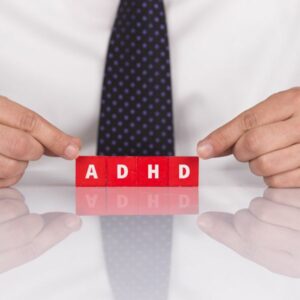
24 May 10 Signs and Symptoms of ADHD in Adults
10 SIGNS AND SYMPTOMS OF ADHD IN ADULTS

Signs and Symptoms of ADHD in Adults
ADHD is a neurodevelopmental disorder whose signs can be visible since childhood. But it is not restricted to young age only and can enter adulthood. So it’s necessary to understand the signs and symptoms of attention-deficit hyperactivity disorder to seek the required support that got unnoticed during childhood.
1. Inattention
For adults with ADHD, inattention can significantly impact their daily lives. It can affect their job performance, relationships with others, and overall quality of life. Many adults may need help staying focused during meetings or work assignments, causing them to miss important details or deadlines.
Attention dysregulation may affect task completion in the following ways:
- Following the instructions for the tasks
- Focusing on important details
- Organizing the tasks (preparing schedules to complete)
- Trouble remembering where they put things
- Forgetting appointments
- Losing track of time
Several strategies can be used to manage inattention. These include cognitive-behavioral therapy (CBT), medication management, mindfulness techniques, and organizational tools such as planners or reminder apps.
2. Hyperactivity
This symptom is usually visible in the classroom. A child with ADHD that displays hyperactivity may continue to experience it in adulthood. At present, this figure is around 60%.
The primary sign is the need to move now and then. While this symptom is more prevalent in children than adults, you could witness trouble sitting, relaxing, and even fidgeting.
- Difficulty sitting still for long periods
- Constantly tapping or fidgeting their feet
- Interrupting others during a conversation
Hyperactivity can also lead to impulsive decisions. So a person with ADHD may engage in activities without considering the consequences. Overall, it paves the way for work and personal relationship difficulties.
3. Impulsivity
Impulsivity is a key characteristic of this neurodevelopmental disorder. It can be defined as acting without thinking about the consequences of one’s actions. It can manifest as interrupting others during conversations, speaking before thinking, taking risks without considering the potential outcomes, and making impulsive purchases or decisions.
Impulsivity is also associated with difficulty inhibiting one’s behavior or delaying gratification. For example, adults with ADHD may struggle to control their impulses to eat junk food or abuse substances. They may also have trouble managing their finances and adhering to long-term goals because they focus more on immediate rewards than delayed ones.
Overall, impulsivity can significantly impact the lives of adults with ADHD by leading to social and occupational difficulties.

4. Emotional Dysregulation
People with ADHD may experience emotional dysregulation due to impulsive behavior and difficulty focusing on specific tasks. That is the difficulty of regulating emotions, such as anger, sadness, anxiety, and frustration.
- Being prone to irritability
- Low tolerance for frustration
- Trouble dealing with stressful situations
Heightened emotional responses or outbursts may happen. These can disrupt both personal and professional settings. They may also struggle with self-esteem issues due to their inability to control their emotions effectively.
Seeking therapy or counseling is one option that can help individuals develop coping mechanisms for dealing with intense emotions.
5. Problems with Motivation and Procrastination
One of the reasons why people with ADHD struggle with motivation is due to the brain’s reward system. The brain releases dopamine when we accomplish something rewarding or pleasurable.
In ADHD brains, this reward system is impaired because dopamine levels are lower than normal. This means that people with ADHD may have difficulty experiencing pleasure from activities that others find enjoyable or fulfilling.
6. Forgetfulness
Remembering important details is one of the many symptoms of ADHD in adults. It can make it hard to remember appointments or even deadlines. The main reason is the effect on working memory due to this condition.
Working memory allows us to pay attention to the task at hand. Naturally, it enables us to access information while doing a certain activity or job. For adults with ADHD, it is a challenge to maintain this information for an extended period without support.
7. Disorganization
We can also link forgetfulness to disorganization. In adults with ADHD, the struggle to manage time and prioritize tasks can be present. It can add up to distractions from their responsibilities – personally and professionally.

8. Time Management
Chronic lateness can be a major sign of poor management in adults with ADHD. It can lead to a sense of overwhelm. They may struggle to create daily schedules and routines, along with being able to stick to them.
Breaking down tasks into manageable steps can make room for relaxation. With help, setting realistic deadlines and preventing burnout are possible.
9. Poor Listening Skills
Adults with ADHD may struggle with paying attention during conversations. As a result, they may miss out on essential details and instructions. One of the most common signs is appearing distracted, with frequent interruptions and forgetting the topics discussed.
10. Impatience
The inability to focus on tasks also results in impatience. It can lead to frustration and the desire to get quick results. The behavior can manifest in various ways, such as difficulty waiting in lines or sitting through meetings and lectures. Another sign is reacting to things if they don’t go as planned and feeling low in case of no immediate rewards for motivation.
Conclusion
ADHD can be a challenging condition to identify and manage. So if left undiagnosed in childhood, all the above signs and symptoms can help identify ADHD in adults. With proper diagnosis and management strategies, individuals with adult ADHD can learn to manage their symptoms effectively.
It’s important to note that an adult with ADHD may or may not experience all of the mentioned signs. So seeking the support of a mental health professional is essential instead of self-diagnosis.
Check Our Our Other Blogs:
Craig Selinger
Latest posts by Craig Selinger (see all)
- Psychotherapy and Support Services at Cope With School NYC - April 12, 2024
- NYC Parents of Teens Support Group - April 8, 2024
- Here I Am, I Am Me: An Illustrated Guide to Mental Health - April 4, 2024


No Comments